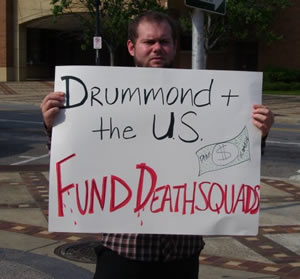Murder in Colombia and a US multinational

Los Angeles Times | October 1, 2009
Murder in Colombia and a U.S. multinational
Did officials of Drummond Co., a U.S. coal operation, play a role in the deaths of at least two men in Colombia?
Colombia is the most dangerous place in the world to be a union organizer. In the last 17 years, more than 2,700 teachers, farmworkers, coal miners and other laborers have paid with their lives for seeking rights that Americans have long taken for granted, such as safe working conditions. During that same period, there were more than 4,000 reported death threats against labor leaders, 350 disappearances and kidnappings, and 75 cases of torture.
Under international pressure, President Alvaro Uribe has made strides in addressing the problem. In 2007, the office of the attorney general created a special unit to focus on anti-union crimes, and it is working its way through the backlog of thousands of unsolved cases. More progress has been made in the last two years than in the previous 10, which is encouraging. It is troubling, however, that when a defendant is convicted, it is generally a hit man or low-level thug and almost never the mastermind or shot-caller who ordered a labor leader’s murder.
That’s why it is significant that a judge in Colombia has asked the attorney general to launch a criminal investigation of top executives at Alabama-based Drummond Co., a multinational coal company. At issue is whether Drummond executives collaborated with the United Self-Defense Forces of Colombia (AUC in Spanish), a U.S.-designated terrorist organization, to murder union leaders organizing the Drummond coal mine in La Loma in 2001. Relatives of three slain men, Valmore Locarno, Victor Orcasita and Gustavo Soler, sued Drummond in Birmingham and lost — proof, the company says, of its innocence. But new evidence has emerged: In sworn affidavits, ex-paramilitary soldiers are naming top Drummond executives as having requisitioned and paid for two of the murders. The company says those allegations are false.
On the basis of the new information, another wrongful-death suit was brought against the company in May in Birmingham.But a civil action in the United States is no substitute for a criminal investigation in Colombia. The perilous environment for workers there exists not only because of the violence they face but the historical impunity of their attackers.
U.S. and European labor leaders are watching this case closely and pointing to it as an example of why they object to the United States’ proposed free-trade agreement with Colombia: If Colombian workers can’t freely unionize, there’s no level playing field between the countries. We continue to support ratification of the agreement. But we see this as an opportunity for Colombia to demonstrate that its judicial system can investigate low-level wiseguys and a giant multinational as well.





